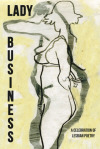Lady Business
From Sibling Rivalry Press, publishers of Assaracus: A Journal of Gay Poetry, comes a new contribution to the GLBT canon. This one is a collection of lesbian poetry from both established and new authors. Before the poems, a paragraph or so provides details about each author. While usually this information is found at the end of a collection, here it sets up the reader for what he/she is about to read. This book includes a nice assortment of poems, and it was refreshing to read such a wide variety of works from each author. In this collection, there is no “one and done.” Through their poetry, the reader is truly able to get to know each writer before it is time to move on to the next.
From Sibling Rivalry Press, publishers of Assaracus: A Journal of Gay Poetry, comes a new contribution to the GLBT canon. This one is a collection of lesbian poetry from both established and new authors. Before the poems, a paragraph or so provides details about each author. While usually this information is found at the end of a collection, here it sets up the reader for what he/she is about to read. This book includes a nice assortment of poems, and it was refreshing to read such a wide variety of works from each author. In this collection, there is no “one and done.” Through their poetry, the reader is truly able to get to know each writer before it is time to move on to the next.
Sally Bellerose’s work was a bit repetitive, but some of her lines are pure works of art. The imagery really pulls you into the poem and makes you re-imagine the title. In this case, the title is “Lily Pad:”
This poem is no haiku
It’s a fantasy
of frog-thighed lovers
hopping on
hopping off
Ker-plunk
and gone
There is no punctuation and the words are so simple, yet I found myself entranced by them. For me, it illustrates how lovers are lost in their own world, almost disappearing from the normal world and losing their grounding on reality. We barely notice what is happening until the lovers are gone.
Brit Blalock writes a very interesting and engaging poem, “While Bisexual is a Dirty Word or My Mother Tells Me to Put Down My Torch, So I Write This Poem Instead.” It is about the dynamic between the narrator and her mother after coming out to her family. The poem also compares the gay rights movement with the civil rights movement, which is a truth I have also observed:
While I want to be angry,
somehow I am grateful
that she at least believes
it’s OK to be a gay person
because I have friends
who still aren’t allowed
at Christmas dinner
because their parents
think Jesus will smite them
right there at the table
as someone’s passing
the cornbread or sweet tea.
While there is obviously tension and argument in their relationship, the narrator is able to put her own experience into perspective. Some people are not as lucky, and when they come out, they are shunned from their families for religious or other reasons. There are also problems with her parents’ relationship and we get a 360 view of this narrator who is so grounded in this relationship.
Teresa De La Cruz uses her poem “Because of a Few Poems” as a sort of confessional. She brings us right into her lifestyle from the very beginning:
Because of a few poems
women have taken their clothes off
for me.
They like to rub
my words
all over their naked bodies.
It makes them smile
in their own different ways.
De La Cruz does not just identify as a lesbian in this passage, but as a writer. Each identity is just as strong as the other. The image of a woman rubbing words all over her body is extremely unique, and it is so refreshing to read different descriptions and fresh poetry. She also admits that while the women love her words, the words also love them. De La Cruz has an interesting thing going on; her love life meshes with her writing so completely that it appears they are dependent on each other, or at least feed off of each other. This author also has a poem titled “My Glossary of Terms.” Two inclusions that stood out to me were “ribcage (noun) 2. Evolution put all my important organs under the ribcage, thus I put all my important things there too (i.e. you).” as well as the final stanza: “instructions (noun) 1. I did not purposely throw away the instructions for loving a man, but I did not purposely keep them either.” Though straightforward, the entries are heartfelt and made me melt a little inside.
Andy Izenson crafts some beautiful poetry, but my favorite is her poem “Strawberry.” It starts out with the narrator noting that once, while she was in college, a professor of hers claimed that every poem is a love poem. I may have heard this rumor before, but she sets out to challenge that statement:
I don’t fall in love
and I don’t write love poems.
So this is a tangling of fingers and biting away of moans poems,
a kissing strawberries from your mouth
in a dark stairwell poem,
an eyelashes against my cheek poem,
a poem for you holding me down and holding me down and holding me,
and a poem for your dimples when I call you mine.
Rather than crafting some sappy poem full of “I love yous,” Izenson wants to slam the audience with how powerful love is. Love is not dainty or soft, it is powerful, remarkable; it’s that song that you just can’t get out of your head. The authors in this book prove that love is love and really make you wonder what all this discussion in politics is about.





